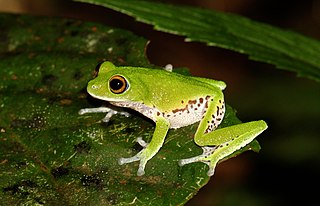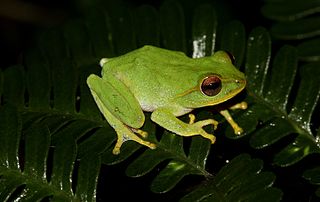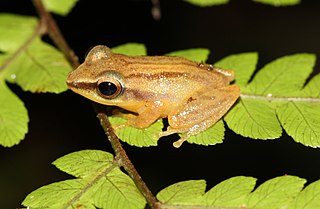
Pseudophilautus auratus, commonly called golden shrub frog, is a species of frog in the family Rhacophoridae, endemic to Sri Lanka, where it lives in closed-canopy cloud forests between 513 and 1270 meters above sea level, including the Sinharaja World Heritage Site and Kanneliya Forest.

Pseudophilautus decoris, commonly known as the elegant shrub frog, is a species of frogs in the family Rhacophoridae. It is endemic to Sri Lanka.
Pseudophilautus folicola, known as leaf-dwelling shrub frog, is a species of frogs in the family Rhacophoridae.

Pseudophilautus fulvus, or the knuckles shrub frog, is a species of frogs in the family Rhacophoridae.

Pseudophilautus lunatus, commonly known as Handapan Ella shrub frog, is a species of frogs in the family Rhacophoridae.
Pseudophilautus mittermeieri, commonly known as Mittermeier's shrub frog, is a species of frog in the family Rhacophoridae. It is endemic to Sri Lanka.

Pseudophilautus mooreorum, commonly known as Moore's shrub frog, is a species of frog in the family Rhacophoridae. It is endemic to Sri Lanka.

Pseudophilautus poppiae, also known as Poppy's shrub frog, is a species of frog in the family Rhacophoridae. It is endemic to Sri Lanka. Its natural habitat is subtropical or tropical moist montane forests.Scientists have seen it between 1060 and 1270 meters above sea level.

Pseudophilautus popularis, the common shrub frog, is a species of frogs in the family Rhacophoridae.

Pseudophilautus rus, known as Kandian shrub frog is a species of frog in the family Rhacophoridae.

Pseudophilautus stuarti, known as Stuart's shrub frog, is a species of frogs in the family Rhacophoridae. It is endemic to Sri Lanka. It was first formally observed in Corbett's Gap in the Knuckles Mountain Range, 1249 meters above sea level.

Pseudophilautus variabilis, also known as the variable bush frog or variable bubble-nest frog, is a species of frog in the family Rhacophoridae. This now extinct species was endemic to Sri Lanka. Despite extensive searches in recent times, it is only known from collections prior to 1858. The reasons for its disappearance are unknown but probably involve habitat loss.

Pseudophilautus viridis, or the dull-green shrub frog, is a species of frogs in the family Rhacophoridae. It is endemic to Sri Lanka and occurs in the central hills of south-central Sri Lanka.

Pseudophilautus zorro, the Gannoruwa shrub frog is a species of frogs in the family Rhacophoridae. It is endemic to central Sri Lanka. People have seen it near Kandy and in the Knuckles Forest Reserve, 500-800 meters above sea level.
Pseudophilautus pardus is an extinct species of Sri Lankan shrub frogs in the family Rhacophoridae. Despite extensive surveys in recent years, the species is known only from a collection made prior to 1858. The reason for its extinction is unknown but probably relates loss of forests.

Pseudophilautus is a genus of shrub frogs in the family Rhacophoridae endemic to the Western Ghats of southwestern India and to Sri Lanka where the majority of the species are found. Many of them are already extinct. On the other, some species believed to be extinct have also been rediscovered.

Pseudophilautus semiruber, known as Annandale's shrub frog, is a species of frog in the family Rhacophoridae that is endemic to Sri Lanka.
Pseudophilautus schneideri is a species of frogs in the family Rhacophoridae, endemic to Sri Lanka. People have seen it in only a few places: Kudawa, Pituwela, and Kanneliya. People have seen it between 1100 and 1400 meters above sea level.
Pseudophilautus singu is a species of frog in the family Rhacophoridae, endemic to southwestern Sri Lanka. It is known from the Kanneliya-Dediyagala-Nakiyadeniya, Kitulgala, and Kottawa Forest Reserves and from the Sinharaja World Heritage Site. The specific name singu is Sinhalese for "horn" and refers to the horn-like tubercles on the upper eyelids of this frog. Common name Sri Lanka short-horned shrub frog has been coined for it.

Sri Lanka petite shrub frog,, is a species of frogs in the family Rhacophoridae, endemic to southwestern Sri Lanka. This relatively recently described species is only known from two locations in the Galle District, Beraliya and Kanneliya Forest Reserves. The specific name tanu is Sinhalese for "slender" and refers to the habitus of this frog.














